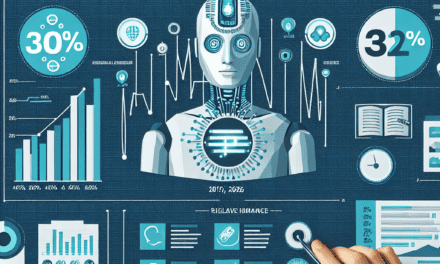AI: A Potential Game Changer in Healthcare, Demanding Cautious Implementation

Artificial Intelligence (AI) is revolutionizing various sectors, and healthcare is no exception. The integration of AI into healthcare systems promises to enhance patient care, streamline operations, and reduce costs. However, the implementation of AI in healthcare must be approached with caution due to ethical, legal, and practical challenges. This article explores the transformative potential of AI in healthcare while emphasizing the need for careful and responsible deployment.
1. The Transformative Potential of AI in Healthcare
AI’s potential to transform healthcare is immense, offering solutions that can improve diagnostics, personalize treatment plans, and enhance patient outcomes. The technology’s ability to process vast amounts of data quickly and accurately makes it an invaluable tool in modern medicine.
1.1 Enhancing Diagnostic Accuracy
AI algorithms have shown remarkable proficiency in diagnosing diseases with high accuracy. For instance, AI systems can analyze medical images such as X-rays, MRIs, and CT scans to detect abnormalities that might be missed by human eyes. A study published in the journal “Nature” demonstrated that an AI model developed by Google Health outperformed radiologists in detecting breast cancer from mammograms.
Moreover, AI can integrate data from various sources, including electronic health records (EHRs), to provide a comprehensive view of a patient’s health. This holistic approach enables early detection of diseases, allowing for timely intervention and improved patient outcomes.
1.2 Personalizing Treatment Plans
AI’s ability to analyze large datasets enables the development of personalized treatment plans tailored to individual patients. By considering genetic information, lifestyle factors, and medical history, AI can recommend the most effective treatment options for each patient. This personalized approach not only enhances treatment efficacy but also minimizes adverse effects.
For example, IBM Watson for Oncology uses AI to analyze patient data and provide oncologists with evidence-based treatment recommendations. This tool has been used in several hospitals worldwide, demonstrating its potential to improve cancer care.
1.3 Streamlining Healthcare Operations
AI can optimize healthcare operations by automating routine tasks, reducing administrative burdens, and improving resource allocation. For instance, AI-powered chatbots can handle patient inquiries, schedule appointments, and provide medication reminders, freeing up healthcare professionals to focus on more complex tasks.
Additionally, AI can predict patient admission rates, enabling hospitals to manage resources more efficiently. This predictive capability helps in reducing wait times, improving patient flow, and enhancing overall hospital efficiency.
1.4 Reducing Healthcare Costs
The implementation of AI in healthcare has the potential to significantly reduce costs. By improving diagnostic accuracy and personalizing treatment plans, AI can minimize unnecessary tests and procedures, leading to cost savings. Furthermore, AI-driven operational efficiencies can reduce administrative expenses and optimize resource utilization.
A report by Accenture estimates that AI applications could save the U.S. healthcare industry up to $150 billion annually by 2026. These savings could be reinvested in improving patient care and expanding access to healthcare services.
1.5 Enhancing Patient Engagement and Experience
AI can enhance patient engagement by providing personalized health information and support. For example, AI-powered mobile apps can offer patients tailored health advice, track their progress, and provide motivation to adhere to treatment plans. This increased engagement can lead to better health outcomes and improved patient satisfaction.
Moreover, AI can facilitate remote monitoring and telemedicine, allowing patients to receive care from the comfort of their homes. This convenience is particularly beneficial for patients with chronic conditions or those living in remote areas with limited access to healthcare facilities.
2. Ethical and Legal Challenges of AI in Healthcare
While AI holds great promise for healthcare, its implementation raises several ethical and legal challenges that must be addressed to ensure responsible use. These challenges include issues related to data privacy, algorithmic bias, and accountability.
2.1 Data Privacy and Security
The use of AI in healthcare relies heavily on access to large volumes of patient data. This raises concerns about data privacy and security, as sensitive health information could be vulnerable to breaches and misuse. Ensuring the confidentiality and integrity of patient data is paramount to maintaining trust in AI systems.
Healthcare organizations must implement robust data protection measures, such as encryption and access controls, to safeguard patient information. Additionally, compliance with regulations like the Health Insurance Portability and Accountability Act (HIPAA) is essential to protect patient privacy.
2.2 Algorithmic Bias and Fairness
AI algorithms are only as good as the data they are trained on. If the training data is biased or unrepresentative, the resulting AI models may perpetuate or even exacerbate existing disparities in healthcare. For example, an AI system trained predominantly on data from a specific demographic group may not perform well for patients from other groups.
To address algorithmic bias, it is crucial to ensure that AI models are trained on diverse and representative datasets. Additionally, ongoing monitoring and evaluation of AI systems are necessary to identify and mitigate any biases that may arise.
2.3 Accountability and Liability
The use of AI in healthcare raises questions about accountability and liability in the event of errors or adverse outcomes. Determining who is responsible for decisions made by AI systems can be challenging, particularly when these systems operate autonomously.
Clear guidelines and regulations are needed to define the roles and responsibilities of healthcare providers, AI developers, and other stakeholders. Establishing a framework for accountability will help ensure that AI systems are used safely and ethically.
2.4 Informed Consent and Transparency
Informed consent is a fundamental principle of medical ethics, requiring that patients understand the risks and benefits of any treatment or intervention. The use of AI in healthcare introduces new complexities to the informed consent process, as patients may not fully understand how AI systems work or how their data will be used.
Healthcare providers must ensure that patients are adequately informed about the role of AI in their care and obtain their consent before using AI-driven tools. Transparency about the capabilities and limitations of AI systems is essential to maintaining patient trust.
2.5 Ethical Use of AI in Decision-Making
AI systems can assist healthcare professionals in making clinical decisions, but they should not replace human judgment. Ethical considerations must guide the use of AI in decision-making, ensuring that patient welfare remains the top priority.
Healthcare providers should use AI as a tool to support, rather than replace, their expertise and judgment. Collaborative decision-making, where AI insights are combined with clinical experience, can lead to better patient outcomes.
3. Case Studies: Successful AI Implementations in Healthcare
Several case studies highlight the successful implementation of AI in healthcare, demonstrating its potential to improve patient care and operational efficiency. These examples provide valuable insights into the benefits and challenges of integrating AI into healthcare systems.
3.1 AI in Radiology: Detecting Lung Cancer
One notable case study involves the use of AI in radiology to detect lung cancer. Researchers at Stanford University developed an AI algorithm capable of analyzing chest X-rays to identify early signs of lung cancer. The algorithm demonstrated a higher accuracy rate than human radiologists, highlighting its potential to improve early detection and treatment outcomes.
This AI system has been integrated into clinical workflows at several hospitals, where it assists radiologists in interpreting X-ray images. The collaboration between AI and human experts has led to more accurate diagnoses and timely interventions, ultimately benefiting patients.
3.2 AI in Pathology: Enhancing Cancer Diagnosis
AI has also been successfully implemented in pathology to enhance cancer diagnosis. PathAI, a Boston-based company, developed an AI platform that analyzes pathology slides to identify cancerous cells with high precision. The platform has been used in clinical trials to improve the accuracy and efficiency of cancer diagnosis.
By automating the analysis of pathology slides, PathAI’s platform reduces the workload of pathologists and minimizes the risk of human error. This technology has the potential to revolutionize cancer diagnosis, leading to earlier detection and improved patient outcomes.
3.3 AI in Cardiology: Predicting Heart Disease
In cardiology, AI has been used to predict the risk of heart disease and improve patient management. Researchers at the Mayo Clinic developed an AI algorithm that analyzes electrocardiogram (ECG) data to identify patients at risk of atrial fibrillation, a common heart condition that can lead to stroke.
The algorithm demonstrated high accuracy in predicting atrial fibrillation, allowing for early intervention and preventive measures. This AI-driven approach has been integrated into clinical practice at the Mayo Clinic, where it supports cardiologists in managing patients with heart disease.
3.4 AI in Drug Discovery: Accelerating Research
AI is also transforming the field of drug discovery by accelerating research and development processes. Insilico Medicine, a biotechnology company, uses AI to identify potential drug candidates and predict their efficacy. The company’s AI platform has successfully identified several promising compounds for the treatment of various diseases.
By streamlining the drug discovery process, AI can significantly reduce the time and cost associated with bringing new drugs to market. This has the potential to improve access to innovative treatments and address unmet medical needs.
3.5 AI in Telemedicine: Expanding Access to Care
AI-powered telemedicine platforms are expanding access to healthcare services, particularly in underserved areas. Babylon Health, a UK-based company, developed an AI-driven app that provides virtual consultations and health assessments. The app uses AI algorithms to analyze symptoms and provide personalized health advice.
Babylon Health’s app has been widely adopted in the UK and other countries, where it offers patients convenient access to healthcare services. By reducing the need for in-person visits, AI-powered telemedicine can improve healthcare accessibility and reduce the burden on healthcare systems.
4. Challenges and Limitations of AI in Healthcare
Despite its potential, the implementation of AI in healthcare is not without challenges and limitations. These include technical, organizational, and societal barriers that must be addressed to fully realize the benefits of AI in healthcare.
4.1 Technical Challenges
One of the primary technical challenges of AI in healthcare is the need for high-quality data. AI algorithms require large volumes of accurate and diverse data to function effectively. However, healthcare data is often fragmented, inconsistent, and incomplete, posing a significant barrier to AI implementation.
Additionally, the complexity of healthcare data, which includes structured and unstructured information from various sources, presents challenges for data integration and analysis. Developing AI systems that can effectively process and interpret this complex data is a critical technical hurdle.
4.2 Organizational Challenges
Integrating AI into healthcare organizations requires significant changes to existing workflows and processes. Healthcare providers may face resistance to change from staff who are accustomed to traditional methods of care delivery. Overcoming this resistance requires effective change management strategies and training programs to ensure that staff are comfortable using AI tools.
Furthermore, the implementation of AI systems may require substantial investments in infrastructure and technology. Healthcare organizations must carefully assess the costs and benefits of AI adoption to ensure that it aligns with their strategic goals and objectives.
4.3 Societal Challenges
The use of AI in healthcare raises societal challenges related to equity and access. There is a risk that AI technologies could exacerbate existing disparities in healthcare if they are not accessible to all patients. Ensuring equitable access to AI-driven healthcare services is essential to prevent widening health disparities.
Moreover, the potential impact of AI on employment in the healthcare sector is a concern. While AI can automate routine tasks, it may also lead to job displacement for certain roles. Addressing these societal challenges requires careful consideration of the broader implications of AI adoption in healthcare.
4.4 Limitations of AI Algorithms
AI algorithms have inherent limitations that must be acknowledged. While AI can process large volumes of data quickly, it may not always provide accurate or reliable results. The performance of AI systems is highly dependent on the quality of the data they are trained on, and any biases or errors in the data can affect the outcomes.
Additionally, AI algorithms may lack the ability to understand context or make nuanced decisions. Human oversight is essential to ensure that AI-driven recommendations are appropriate and aligned with patient needs.
4.5 Regulatory and Compliance Challenges
The regulatory landscape for AI in healthcare is still evolving, with many uncertainties regarding compliance and approval processes. Healthcare organizations must navigate complex regulatory requirements to ensure that their AI systems meet safety and efficacy standards.
Establishing clear regulatory frameworks for AI in healthcare is essential to provide guidance and assurance to stakeholders. Collaboration between regulators, industry leaders, and healthcare providers is necessary to develop standards that promote the safe and ethical use of AI technologies.
5. Strategies for Responsible AI Implementation in Healthcare
To harness the full potential of AI in healthcare while addressing its challenges, a strategic and responsible approach to implementation is essential. This involves adopting best practices, fostering collaboration, and prioritizing patient-centered care.
5.1 Ensuring Data Quality and Integrity
High-quality data is the foundation of effective AI systems. Healthcare organizations must invest in data management practices that ensure the accuracy, completeness, and consistency of their data. This includes implementing data governance frameworks, standardizing data formats, and addressing data silos.
Collaboration with data scientists and AI experts can help healthcare organizations develop robust data pipelines that support AI initiatives. By prioritizing data quality and integrity, organizations can enhance the performance and reliability of their AI systems.
5.2 Promoting Interdisciplinary Collaboration
The successful implementation of AI in healthcare requires collaboration between diverse stakeholders, including healthcare providers, AI developers, regulators, and patients. Interdisciplinary collaboration fosters innovation and ensures that AI solutions are aligned with clinical needs and ethical standards.
Healthcare organizations should establish partnerships with academic institutions, technology companies, and industry associations to leverage expertise and resources. Collaborative efforts can drive the development of AI solutions that address real-world healthcare challenges.
5.3 Prioritizing Patient-Centered Care
AI implementation should prioritize patient-centered care, ensuring that technologies enhance, rather than detract from, the patient experience. Healthcare providers must engage patients in the design and deployment of AI systems, seeking their input and feedback to ensure that solutions meet their needs.
Transparency and communication are key to building patient trust in AI technologies. Healthcare organizations should provide clear information about how AI is used in patient care and involve patients in decision-making processes.
5.4 Establishing Ethical Guidelines and Standards
Developing ethical guidelines and standards for AI in healthcare is essential to ensure responsible use. These guidelines should address issues related to data privacy, algorithmic bias, accountability, and informed consent.
Healthcare organizations should establish ethics committees or advisory boards to oversee AI initiatives and provide guidance on ethical considerations. By adhering to ethical standards, organizations can promote the safe and equitable use of AI technologies.
5.5 Continuous Monitoring and Evaluation
Continuous monitoring and evaluation of AI systems are critical to ensuring their effectiveness and safety. Healthcare organizations should implement processes for ongoing assessment of AI performance, including regular audits and validation studies.
Feedback loops should be established to identify and address any issues or biases that arise during the use of AI systems. By continuously monitoring and evaluating AI technologies, organizations can make data-driven improvements and ensure that AI solutions remain aligned with clinical goals.
Conclusion
AI has the potential to be a game changer in healthcare, offering solutions that can improve patient care, enhance operational efficiency, and reduce costs. However, the implementation of AI in healthcare must be approached with caution, considering the ethical, legal, and practical challenges it presents.
By adopting responsible implementation strategies, healthcare organizations can harness the transformative power of AI while ensuring patient safety and equity. Collaboration, transparency, and a commitment to ethical standards are essential to realizing the full potential of AI in healthcare.
As AI continues to evolve, it is crucial for stakeholders to work together to address challenges and seize opportunities. With careful and thoughtful implementation, AI can revolutionize healthcare and improve outcomes for patients worldwide.




